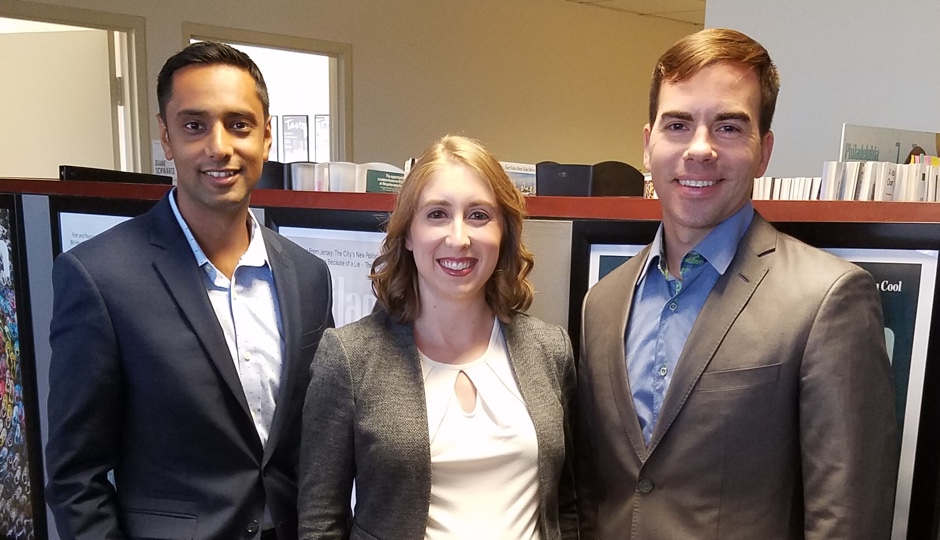Philly Startup Plans to Modernize the Medical Transportation Industry
Nonemergency medical transportation is an industry that’s hardly ever stress-free: Nonemergency medical trips constitute 50 percent of all medical transportation in the country, yet the people who rely on these rides, including the elderly, sick and disabled, are often left stranded because of shoddy transportation logistics.
That’s where RoundTrip comes in.
The Philadelphia-based startup recently launched a platform to simplify the nonemergency transportation space, an arena that rakes in about $13 billion in annual revenue. The platform targets the medical transportation services booked by care coordinators, those who move patients between healthcare facilities, from a healthcare facility to another location, and from another location to a facility via transportation companies. (Disclosure: RoundTrip was a finalist in Philadelphia magazine’s The Pitch competition presented by UnitedHealthcare.)
In Philadelphia alone, more than 40 different nonemergency transportation companies collectively provide more than 1 million rides annually, the new company says, but right now there’s an oversupply of providers and no easy way to connect hospitals in need of transportation with providers that have additional capacity.
“RoundTrip was created to solve a real-world problem that every hospital faces,” said founder and CEO Mark Switaj in a statement. “More than 3.6 million doctors visits are missed or delayed each year due to transportation issues.”

Left to right: RoundTrip chief information officer Ankit Mathur, corporate administrator Angela Damiano, and founder and CEO Mark Switaj.
Switaj founded Roundtrip at the beginning of 2016 after 15 years in various roles in the patient transportation field, including EMT. His co-leaders, Ankit-Mathur and Angela Damiano, with experience in software product development and financial analytics between them, will serve as the company’s chief information officer and corporate administrator, respectively.
Through RoundTrip’s web-based portal for care coordinators, users can enter patient information, see estimated patient arrival and departure times, and electronically book transportation requests. With the mobile app, drivers can accept requests and receive real-time feedback while being connected to the unit secretaries, social workers, and nurses who request their services.
It may be easy to call RoundTrip the Uber of medical transportation, but it’s not that simple. Roundtrip’s model is B2B — it connects care coordinators with transportation providers, so right now, patients are not responsible for arranging their rides.
Roundtrip charges a flat rate per ride and can adapt to multiple payer sources, including insurers, hospitals, patients and family members. The company may also generate revenue through a brokerage fee charged to the transportation provider for each referred transport.
And not just anyone can get behind the wheel. By partnering with local medical transportation companies, RoundTrip’s network consists of credentialed drivers who have gone through various HIPAA and medical certification processes, the company says. Vehicles must also pass “cleanliness” standards to operate with RoundTrip.
At the moment, the company sees “the old-school model of picking up the phone and being placed on hold” as their competition, Mathur told Philadelphia magazine. The company isn’t entering a crowded space of innovators looking to shake up nonemergency transportation, though Uber just last last week announced a partnership with Circulation, a Boston-based health care transportation firm. Uber is piloting its program in Philadelphia, Wilmington, and Boston, according to the PBJ.
But to further distinguish itself, RoundTrip also wants to improve the quality of nonemergency medical transportation and the productivity of drivers. The startup has found that, nationally, for every ten-hour shift a patient vehicle is on the road, only three and a half hours are spent transporting patients. RoundTrip says it wants to help companies fill productivity gaps and also push drivers to provide high-quality care by creating competition on the platform.
“A big part of our model is quality,” said Mathur. “Right now, drivers don’t receive feedback on their performance, and they are never incentivized to provide high-quality care. It’s part of the problem with nonemergency transportation.”
The platform’s feedback system and points-based reward program are designed to increase the quantity and quality of trips. The transportation companies with the highest ratings will rise to the top of RoundTrip’s system and be more likely to be referred to care coordinators. And at the same time, RoundTrip plans to work with transportation companies to provide better training for vehicle operators.
“No one is collecting data about quality right now,” Mathur said, “and when we pitch this side of our platform to transportation providers, their eyes light up because they want to provide high-quality service.”
RoundTrip is now in talks with hospital systems in Philadelphia, South Jersey, and northern Delaware. “We’re trying to reach as many hospital providers as possible to make sure that they know about our platform,” said Mathur.
And in terms of expansion, Mathur says the application has no bounds.
“We can deal with someone in Philly and someone out in Nevada, it can span anywhere. Once we onboard a client, it’s then about building a system of medical transportation companies.”
Follow @fabiolacineas on Twitter.


